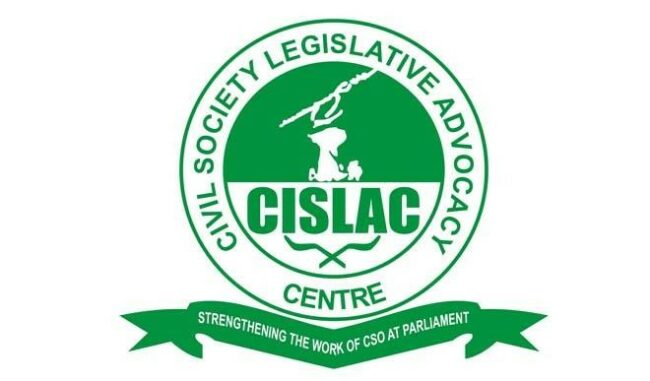
Executive Director of Civil Society Legislative Advocacy Centre (CISLAC), Comrade Auwal Musa Rafisanjani on Monday, lauded Nigeria’s anti-the corruption agencies for their relentless efforts in combating corruption despite severe political control, limited resources, and personal risks.
Rafisanjani who gave the commendation in a statement issued to commemorate the 2024 Anti-Corruption Day, lamented that “Many of these individuals have faced threats to their lives for their work, underscoring the huge sacrifices they make daily to safeguard Nigeria’s future.

“It is imperative that Nigerians collectively support these agencies to ensure they deliver optimally. Corruption continues to plague every sector of Nigeria’s socio-economic and political landscape, serving as the root cause of systemic failures and deepening poverty, insecurity, and underdevelopment.
“As we mark International Anti-Corruption Day 2024, it is imperative to examine the pervasive effects of corruption in detail and emphasize its role in undermining national progress.”
While beaming the searchlight on the security sector, he alleged that “corruption has severely undermined Nigeria’s fight against insurgency and insecurity, diverting critical funds meant to bolster national defense into private hands.
“Billions allocated for counterterrorism have been misappropriated, leaving troops under-equipped and demoralized while insurgent groups, such as the Lakarawas, gain ground. Recruitment into these groups thrives on widespread poverty and unemployment, exacerbated by systemic corruption.
“High-profile cases illustrate the depth of the problem. For instance, Brigadier General M.A. Sadiq is accused of diverting rice palliatives for troops and selling military equipment as scrap. Transparency International and CISLAC reported the recovery of $8.9 million in diverted military funds from foreign accounts, originally allocated for fighting Boko Haram.
“Additionally, a 2020 Auditor-General report revealed that N442.2 million was misappropriated by the Nigeria Police Force for security equipment never supplied. The consequences of such corruption are devastating.
“The National Security Adviser, Nuhu Ribadu, recently criticised security personnel for selling arms to criminals, highlighting the role of such practices in fueling violence. The dire conditions for security agents—ranging from delayed retirement benefits to inadequate support for the families of fallen personnel—further compromise morale and effectiveness.
“This cycle of corruption extends beyond defense, affecting the broader populace. Over 4.3 million Internally Displaced Persons (IDPs) languish in camps, predominantly in Borno, Yobe, and Adamawa states, facing squalid living conditions with little hope of resettlement.
“Meanwhile, extortion and bribery at checkpoints and borders hamper economic activities and deter both local and international investors.
“Corruption’s entrenchment in Nigeria’s security apparatus not only endangers national stability but also perpetuates poverty, weakens governance, and compromises the safety of millions. Urgent reforms and accountability are critical to breaking this vicious cycle.”
In the bid to tackle the menace of corruption in every sector of the country’s economy, the CISLAC helmsman harped on the need for the Nigerian government to “roll back laws that inhibit free speech, ensuring the protection of journalists, activists, and citizens who expose corruption.
“Public awareness campaigns should be launched to educate the population on their rights and corruption reporting mechanisms. Furthermore, anti-corruption legislation should be strengthened, addressing gaps in asset declarations, public procurement transparency, and anti-money laundering frameworks.”
He specifically expressed grave concern over the effects of corruption being perpetuated through sectors including security, the banking industry, healthcare, education, humanitarian space, water and sanitation, the petroleum industry, as well as the judicial arm of government, among others.
While reflecting on the report on oil theft and economic sabotage, Rafisanjani who doubles as Head, Transparency International (Nigeria), lamented that: “Oil theft remains one of the most significant sources of economic sabotage in Nigeria. An estimated 400,000 barrels of oil are stolen every day, amounting to billions of dollars in lost revenue annually.
“The theft is facilitated by corrupt networks involving politicians, security officials, and insiders within oil companies, which often use their influence to bypass regulations or look the other way. According to the Nigerian National Petroleum Corporation (NNPC), the country loses approximately $1.5 billion every month due to these criminal activities the government of much-needed revenue, limiting its ability to fund essential services such as healthcare, education, and infrastructure development.
“Tax evasion by multinational companies, including oil firms, has been a persistent issue in Nigeria. Despite the country being rich in oil reserves, many multinational corporations (MNCs) involved in oil extraction operate with little regard for paying fair taxes.
“The Nigeria Extractive Industries Transparency Initiative (NEITI) has documented numerous instances where oil companies underreport their earnings or avoid tax payments through creative accounting practices. NEITI’s 2021 audit revealed that Nigeria lost over $4 billion due to non-compliance with tax regulations and the exploitation of loopholes in the system.
“The absence beneficial ownership register also hinders the identification of individuals behind these companies and their true economic contributions to the country. A transparent register could make it easier for the Nigerian government to track and ensure tax payments from these oil giants. However, the lack of such a registry allows both local and foreign companies to evade taxes, further perpetuating the cycle of corruption in the economy.
“The banking and financial sectors play a crucial role in facilitating corruption in Nigeria. Lax regulations and ineffective enforcement have allowed financial institutions to become conduits for money laundering and terrorism financing. Hidden accounts and shell companies make it easy for politicians and businesspeople to funnel illicit funds both within and outside the country.
“According to the Central Bank of Nigeria (CBN), billions of dollars have been laundered through Nigerian banks in recent years, with little to no action taken to punish the perpetrators. Furthermore, the banking sector has been implicated in enabling terrorism financing. Money from corrupt officials often finds its way into the hands of terrorist organizations. The role of Nigerian banks in facilitating the financial flows of groups like Boko Haram and ISIS affiliates is well-documented, with some banks facing sanctions for their lack of due diligence in monitoring suspicious transactions. This further weakens the nation’s efforts to curb extremism and stabilize the country.
“Failed transfers and the lack of accountability in public funds – A significant issue exacerbating corruption in the Nigerian economy is the amount of money tied up in failed or unreversed transfers. Public funds meant for infrastructure development, healthcare, and education often remain unutilized or misappropriated.
“These funds either vanish through ghost projects, inflated contracts, or simply never reach the intended recipients. In recent years, billions have been allocated to security agencies for counterterrorism measures, yet these funds either fail to materialize on the ground or end up in the pockets of officials.
“The recent case involving a former Nigerian military official, who embezzled $8.9 million meant for equipping the military, underscores the gravity of the situation.”
ALSO READ FROM NIGERIAN TRIBUNE
Address key gaps in tax reform bills, CISLAC tasks NASS







